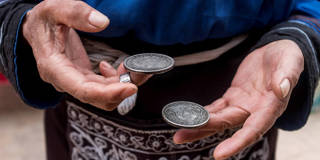In an age of rising new powers and new financial technologies, could the US dollar’s status as the global reserve currency finally come to an end? To answer such questions, it helps to adopt a historical perspective, because the future of money may well resonate with its deep past.
VITERBO, ITALY – We live in a time of unprecedented monetary innovation. Novel private monies like Bitcoin abound, because new technologies have made possible payment systems that bypass traditional banks. With the COVID-19 pandemic having expanded the frontier of “unconventional” monetary policies, central banks have been debating whether to create new digital currencies (CBDCs) of their own.

Akinobu Kuroda, A Global History of Money, Routledge, 2020.
VITERBO, ITALY – We live in a time of unprecedented monetary innovation. Novel private monies like Bitcoin abound, because new technologies have made possible payment systems that bypass traditional banks. With the COVID-19 pandemic having expanded the frontier of “unconventional” monetary policies, central banks have been debating whether to create new digital currencies (CBDCs) of their own.